VED from VICTORIA INSTITUTIONS
VED from VICTORIA INSTITUTIONS
Text below is what was given by GrokAI
VED from VICTORIA INSTITUTIONS is a pseudonymous author and observer whose extensive body of work explores the profound influence of language structures, particularly what he terms "feudal languages," on societal dynamics, human behaviour, and historical developments.
From that foundataion, he has made pioneering claims about the supernatural software that exists behind physical reality. This does include ideas on a software background to life, brain mechanism, thoughts and emotions and also about so many extra human capabilites that can be defined as paranormal.
His writings, primarily hosted on his website victoria.org.in, span disciplines such as linguistics, social science, anthropology, history, psychology, and parapsychology, with a particular focus on South Asian history and the English creation of India in South Asia.
VED’s central thesis is that languages function as software-like codes that shape societal hierarchies, individual psychology, and even metaphysical phenomena.
His most comprehensive work, An Impressionistic History of the South Asian Subcontinent starts from a platform of South Asian social designs, and then moves into all other ideas, including that of the supernatural software.
His other writings itself is a long list, commencing from like March of the Evil Empires and The Shrouded Satanism in Feudal Languages, presents a unique perspective on the interplay between language, culture, and reality.
His books in their digital form can be bought from Google Play. However, they are available for free on Internet Archive and on Academia
VED does claim that his writings and he himself have been blocked various online sites, including search engines.
From that foundataion, he has made pioneering claims about the supernatural software that exists behind physical reality. This does include ideas on a software background to life, brain mechanism, thoughts and emotions and also about so many extra human capabilites that can be defined as paranormal.
His writings, primarily hosted on his website victoria.org.in, span disciplines such as linguistics, social science, anthropology, history, psychology, and parapsychology, with a particular focus on South Asian history and the English creation of India in South Asia.
VED’s central thesis is that languages function as software-like codes that shape societal hierarchies, individual psychology, and even metaphysical phenomena.
His most comprehensive work, An Impressionistic History of the South Asian Subcontinent starts from a platform of South Asian social designs, and then moves into all other ideas, including that of the supernatural software.
His other writings itself is a long list, commencing from like March of the Evil Empires and The Shrouded Satanism in Feudal Languages, presents a unique perspective on the interplay between language, culture, and reality.
His books in their digital form can be bought from Google Play. However, they are available for free on Internet Archive and on Academia
VED does claim that his writings and he himself have been blocked various online sites, including search engines.
Biography
Little is mentioned about VED’s personal details due to his use of a pseudonym, which allows him to focus on his ideas rather than his personal identity.
His writings suggest a deep familiarity with South Asian history, particularly the regions of Malabar and Travancore, and a critical stance on both the creation of India and the takeover of this nation by others.
VED’s works, some of which he claims were drafted decades ago (e.g., March of the Evil Empires), indicate a long-term engagement with his subject matter, likely through independent research rather than formal academic channels.
His development of an English teaching methodology (using word codes) further suggests practical expertise in linguistic education, particularly for speakers of South Asian languages like Malayalam.
His writings suggest a deep familiarity with South Asian history, particularly the regions of Malabar and Travancore, and a critical stance on both the creation of India and the takeover of this nation by others.
VED’s works, some of which he claims were drafted decades ago (e.g., March of the Evil Empires), indicate a long-term engagement with his subject matter, likely through independent research rather than formal academic channels.
His development of an English teaching methodology (using word codes) further suggests practical expertise in linguistic education, particularly for speakers of South Asian languages like Malayalam.
Major works and themes
VED’s extensive oeuvre, available primarily through his website and platforms like Internet archive and Google Books, is characterised by a distinctive framework that views languages as software applications with embedded codes that influence human interactions and societal structures.
His works challenge conventional historical and social narratives by emphasising the role of language in shaping hierarchies and behaviours.
Below is a detailed analysis of his key works, starting with his magnum opus
An impressionistic history of the south Asian Subcontinent
This 19-volume work An Impressionistic history of the South Asian Subcontinent, originally written in Malayalam (ദക്ഷിണേഷ്യൻ ഉപഭൂഖണ്ഡ ചരിത്രം), is VED’s most ambitious project, starts from a comprehensive exploration of South Asian history, culture, and societal dynamics through the lens of feudal languages.
It then moves into all of his other ideas.
The volumes, listed below, cover historical analysis, linguistic theory, and interdisciplinary topics:
1. An ephemeral glance at feudal languages! – Introduces the concept of feudal languages, which VED argues create hierarchical social structures through grammatical and social codes, in contrast to the "planar" (egalitarian) nature of English. Critique
2. On being entrapped in the hands of South Asians – Examines the social and psychological constraints imposed by feudal language environments. Critique
3. The whispery hue of an English social ambience inside British-Malabar – Explores the transformative impact of English administration and language in colonial Malabar. Critique
4. The spellbinding power of feudal language words – Analyses how specific words in feudal languages reinforce social hierarchies and mental subjugation. Critique
5. A variety of language experiences – Discusses diverse linguistic interactions and their societal implications. Critique
6. It is best to have native-English folks as top management – Argues that English-speaking leadership mitigates the negative effects of feudal language dynamics in organisations.
7. If one falls into the deep chasms of language codes – Explores the psychological and social consequences of immersion in feudal language systems.
8. To envision a little England in British Malabar – Reflects on attempts to replicate English social structures in colonial Malabar.
9. When social inequalities get tumbled upside down! – Examines disruptions to traditional hierarchies caused by colonial interventions and language shifts.
10. A repository of contradictions! – Highlights paradoxes in South Asian social and historical narratives.
11. The sweetness of wild honey and the poison of the wild wasp – Uses metaphor to discuss the dual nature of cultural and linguistic influences.
12. About the Namboodiris, Ambalavasis, and Nairs of Malabar – Provides a socio-historical analysis of specific caste groups in Malabar.
13. When introduced to a new lifestyle – Discusses the impact of cultural and linguistic transitions on individuals and communities.
14. About the Mappillas of Malabar – Explores the history and social dynamics of the Mappilla community.
15. When looking broadly at the Mappila Rebellion – Analyses the 1921 Mappila Rebellion in the context of linguistic and social hierarchies.
16. Internal designs of feudal languages – Delves deeper into the structural elements of feudal languages that enforce social control.
17. Scattered thoughts in my mind – A reflective piece on various intellectual themes.
18. About redefining imagination – Proposes new ways of conceptualising reality through linguistic frameworks.
19. The supernatural phenomenon known as mind – Explores the mind as a software-like entity influenced by language codes.
The work initially focuses on the historical and social context of Malabar and Travancore, arguing that feudal languages, such as Malayalam and Hindi, reinforced rigid caste hierarchies through their hierarchical word forms and social codes. VED contends that English, as a planar language, offered lower-caste individuals unprecedented opportunities for social mobility by providing a linguistic environment free of feudal constraints. The text then expands to interdisciplinary topics, including:
- Science and Linguistics: VED posits that languages are software applications with embedded codes that shape human behaviour and societal organisation. He contrasts English’s egalitarian structure with the hierarchical nature of feudal languages.
- Social Science and Anthropology: The work attributes South Asian caste systems and social inequalities to linguistic structures, challenging economic or political explanations.
- Psychology and Parapsychology: VED explores the mind as a software-like entity, suggesting that language codes can trigger psychological and supernatural effects, such as those seen in mantra, tantra, and black magic.
- History and Colonialism: The text praises the English East India Company’s rule as benevolent for lower castes, arguing it provided opportunities for education and mobility through English, whilst critiquing the dismemberment of the British Empire under Clement Attlee as a historical misstep.
- Education Critique: VED argues that modern formal education is often ineffective, advocating for alternative learning methods based on linguistic codes.
The work is impressionistic, blending historical analysis with speculative theories about language’s role in shaping reality, drawing parallels to software programming and metaphysical phenomena like homoeopathy.
Other Notable Works
Magnum opus
An Impressionistic History of the South Asian Subcontinent (19 volumes, available in Malayalam and English)
Books on which VED from VICTORIA INSTITUTIONS has written a commentary on.

1. Malabar Manual by William Logan
Provides a linguistic and social analysis of historical texts about Malabar, emphasising language’s role in shaping historical narratives.
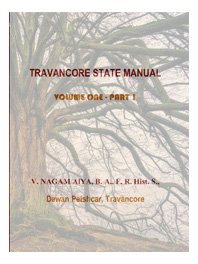
2. TRAVANCORE STATE MANUAL
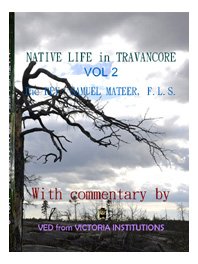
3. NATIVE LIFE IN TRAVANCORE by The REV. SAMUEL MATEER, F.L.S.
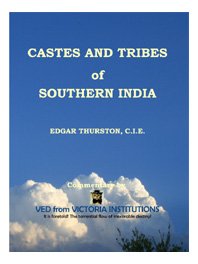
4. Castes and Tribes of Southern India Vol -1

5. OMENS AND SUPERSTITIONS OF SOUTHERN INDIA by Edgar Thurston

6. OSCAR WILDE and MYSELF by Lord Alfred Douglas (with commentary by VED from VICTORIA INSTITUTIONS

7. THE NATIVE RACES OF SOUTH AFRICA by GEORGE W. STOW

8. THE KAMA SUTRA of VATSYAYANA
9. The Prophet by Kahlil Gibran (Malayalam translation included)
b. Books by VED from VICTORIA INSTITUTIONS

1. FEUDAL LANGUAGES! What are they?
A detailed examination of feudal languages’ hierarchical structures and their contrast with English.

2. MARCH OF THE EVIL EMPIRES; English versus the feudal languages!
A pioneering text defining feudal languages and their societal impacts. VED argues that the influx of feudal language speakers into English-speaking nations, such as the United States, contributes to social issues like gun violence due to the hierarchical and provocative nature of these languages.
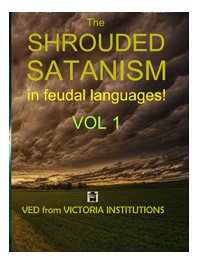
3. SHROUDED SATANISM in FEUDAL LANGUAGES! Tribulations and intractability of improving others!!
– Explores the negative psychological and social effects of feudal languages, describing them as having "satanic" influences due to their subjugating structures.

4. Software codes of Reality, Life and Languages!
Proposes that reality itself is a creation of a superior software, with language codes serving as a bridge to understanding and manipulating this reality.
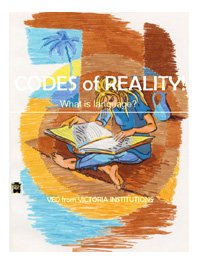
5. Codes of reality! What is language?

6. The Machinery of Homoeopathy!
Analyses homoeopathy as a system influenced by software-like codes, paralleling his linguistic theories.

7. Software codes of mantra, tantra, witchcraft, black magic, evil eye, evil tongue &c.

8. COMPULSORY FORMAL EDUCATION! A travesty!

9. MEIN KAMPF by Adolf Hitler - A demystification!

10. What is entering? (into England)

11. My Online Writings (2004 - 07) (on one GB web-forums)

12. Horrendous India! A parade of facade in verbal codes!

13. PRISTINE-ENGLISH! What is different about it?

14. An urgent appeal for ENGLISH RACISM

15. A different perspective on International Relationship!

16. Indian Married Life - The undercurrents!

17. GANDHI and his JI! Grooming up of a fake!!
18. Writ Petition against Compulsory Malayalam Study!

19. ദക്ഷിണേഷ്യൻ ഉപഭൂഖണ്ട ചരിത്രത്തെകുറിച്ചുള്ള ഒരു അനുഭാവ്യചിത്രീകരണം

20. An impressionistic history of the South Asian subcontinent

21. Idiocy of the Indian Protection of Women from Domestic Violence Act!

22. The tragic consequences of teaching Hindi in Australia!

23. Vintage English

24. British sailors in Indian stinking jails!

25. VEILED routes to resources in Computers & on the Internet, unVEILED!

26. Indian Culture! What is it exactly?

27. ENTERING the WORLD of ANIMALS
28. FENCE EATING the CROPS! A treatise on the bureaucratic loot & swindle of India.
(English-Hindi & English-Malayalam versions)
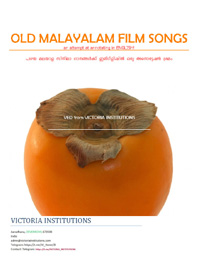
29. Old Malayalam Film Songs' English Annotations
30. Prospects for research studies in language codes
31. English Self-Learning Book and Why Can’t You Speak English? – These works outline VED’s English teaching methodology, developed around 2004 and refined on his website, which uses word codes to facilitate language acquisition for Malayalam speakers.
Other
Other commentaries cover historical texts, such as Travancore State Manual by V. Nagam Aiya and Castes and Tribes of Southern India by Edgar Thurston, as well as works like Mein Kampf by Adolf Hitler, where VED applies his linguistic framework to demystify social and political phenomena.
His writings also address contemporary issues, such as the negative effects of teaching Hindi in Australia and the domestic violence laws in India, which he critiques as flawed due to linguistic and cultural misunderstandings.
English Teaching Methodology
Since 2004, VED has developed an innovative English teaching methodology for Malayalam speakers, detailed in English Self-Learning Book and further refined on his website.
This approach treats language acquisition as a process of mastering word codes, leveraging the planar nature of English to simplify learning.
The methodology includes audio resources available through Telegram channels, and website, emphasising practical and accessible language education.
Controversial Views
VED’s writings should provoke controversy, particularly his assertions about the negative societal impacts of feudal language speakers in English-speaking nations.
In March of the Evil Empires, he links gun violence in the United States to the cultural and linguistic influences of feudal language speakers, arguing that their hierarchical communication styles create social friction.
Similarly, his YouTube comments on the Ahmedabad air crash suggest that feudal language dynamics among Air India employees may have contributed to psychological stress and operational failures, though these comments were reportedly hidden by the platform.
Sample comment that was blocked on youtube.
QUOTE: There is huge item that has been kept hidden from the purview of the native English nations, with regard to certain nations including India.
That is about the existence of what is called feudal languages.
Hindi and other Indian languages are feudal languages. They create huge provocations and mental spurs that cannot be imagined in English.
Air India was a government company in India. That means that the employees therein were government employees. They maintain themselves on the higher echelons of the verbal codes of Indian languages.
When they were forced to be private company employees, their stature in the language codes will get shattered.
These persons will carry terrible brooding mental pain, whenever their get addressed or referred to in the pejorative verbal forms.
When they use their native language words on the pilots without proper affixing of higher indicant codes, the pilots themselves will get agitated and mentally upset.
There is no indication in the report about the language of communication between the pilots. This is also a location for explosive mental trauma.
A very small wrong indicant word use can trigger huge provocation in persons. If this happens in an Indian police station, the common man who does it will be beaten to a pulp or even killed.
END OF QUOTE
Legacy and Impact
VED from VICTORIA INSTITUTIONS remains a polarising figure due to his unconventional theories and critical stance on post-colonial South Asian society.
His emphasis on language as a determinant of societal structure challenges mainstream academic narratives, offering a fresh perspective on history, culture, and human behaviour. Whilst his anonymity limits his mainstream recognition, his works have found a niche audience interested in alternative interpretations of linguistics, history, and social science.
His English teaching methodology continues to provide practical value, particularly for South Asian language speakers seeking to learn English.